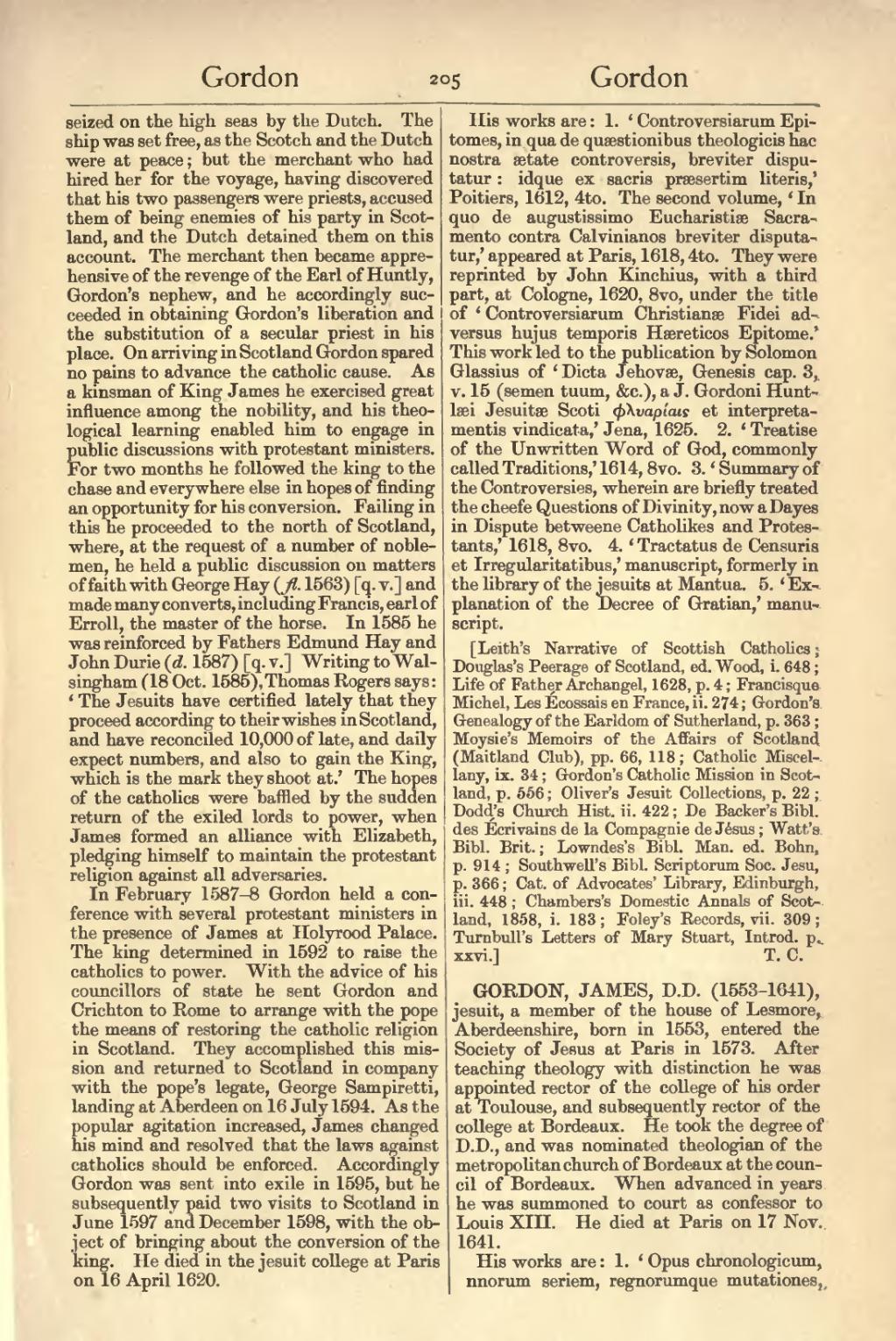seized on the high seas by the Dutch. The ship was set free, as the Scotch and the Dutch were at peace; but the merchant who had hired her for the voyage, having discovered that his two passengers were priests, accused them of being enemies of his party in Scotland, and the Dutch detained them on this account. The merchant then became apprehensive of the revenge of the Earl of Huntly, Gordon's nephew, and he accordingly succeeded in obtaining Gordon's liberation and the substitution of a secular priest in his place. On arriving in Scotland Gordon spared no pains to advance the catholic cause. As a kinsman of King James he exercised great influence among the nobility, and his theological learning enabled him to engage in public discussions with protestant ministers. For two months he followed the king to the chase and everywhere else in hopes of finding an opportunity for his conversion. Failing in this he proceeded to the north of Scotland, where, at the request of a number of noblemen, he held a public discussion on matters of faith with George Hay (fl. 1563) [q. v.] and made many converts, including Francis, earl of Erroll, the master of the horse. In 1585 he was reinforced by Fathers Edmund Hay and John Durie (d. 1587) [q. v.] Writing to Walsingham (18 Oct. 1585), Thomas Rogers says: 'The Jesuits have certified lately that they proceed according to their wishes in Scotland, and have reconciled 10,000 of late, and daily expect numbers, and also to gain the King, which is the mark they shoot at.' The hopes of the catholics were baffled by the sudden return of the exiled lords to power, when James formed an alliance with Elizabeth, pledging himself to maintain the protestant religion against all adversaries.
In February 1587-8 Gordon held a conference with several protestant ministers in the presence of James at Holyrood Palace. The king determined in 1592 to raise the catholics to power. With the advice of his councillors of state he sent Gordon and Crichton to Rome to arrange with the pope the means of restoring the catholic religion in Scotland. They accomplished this mission and returned to Scotland in company with the pope's legate, George Sampiretti, landing at Aberdeen on 16 July 1594. As the popular agitation increased, James changed his mind and resolved that the laws against catholics should be enforced. Accordingly Gordon was sent into exile in 1595, but he subsequently paid two visits to Scotland in June 1597 and December 1598, with the object of bringing about the conversion of the king. He died in the Jesuit college at Paris on 16 April 1620.
His works are: 1. 'Controversiarum Epitomes, in qua de quæstionibus theologicis hac nostra ætate controversis, breviter disputatur: idque ex sacris præsertim literis,' Poitiers, 1612, 4to. The second volume, 'In quo de augustissimo Eucharistiæ Sacramento contra Calvinianos breviter disputatur,' appeared at Paris, 1618, 4to. They were reprinted by John Kinchius, with a third part, at Cologne, 1620, 8vo, under the title of 'Controversiarum Christianæ Fidei adversus hujus temporis Hæreticos Epitome.' This work led to the publication by Solomon Glassius of 'Dicta Jehovæ, Genesis cap. 3, v. 15 (semen tuum, &c.), a J. Gordoni Huntlæi Jesuitæ Scoti φλυαρίαις et interpretamentis vindicata,' Jena, 1625. 2. 'Treatise of the Unwritten Word of God, commonly called Traditions,' 1614, 8vo. 3. 'Summary of the Controversies, wherein are briefly treated the cheefe Questions of Divinity, now a Dayes in Dispute betweene Catholikes and Protestants,' 1618, 8vo. 4. 'Tractatus de Censuris et Irregularitatibus,' manuscript, formerly in the library of the Jesuits at Mantua. 5. 'Explanation of the Decree of Gratian,' manuscript.
[Leith's Narrative of Scottish Catholics; Douglas's Peerage of Scotland, ed. Wood, i. 648; Life of Father Archangel, 1628, p. 4; Francisque Michel, Les Écossais en France, ii. 274; Gordon's Genealogy of the Earldom of Sutherland, p. 363; Moysie's Memoirs of the Affairs of Scotland (Maitland Club), pp. 66, 118; Catholic Miscellany, ix. 34; Gordon's Catholic Mission in Scotland, p. 556; Oliver's Jesuit Collections, p. 22; Dodd's Church Hist. ii. 422; De Backer's Bibl. des Écrivains de la Compagnie de Jésus; Watt's Bibl. Brit.; Lowndes's Bibl. Man. ed. Bohn, p. 914; Southwell's Bibl. Scriptorum Soc. Jesu, p. 366; Cat. of Advocates' Library, Edinburgh, iii. 448; Chambers's Domestic Annals of Scotland, 1858, i. 183; Foley's Records, vii. 309; Turnbull's Letters of Mary Stuart. Introd. p. xxvi.]
GORDON, JAMES, D.D. (1553–1641), Jesuit, a member of the house of Lesmore, Aberdeenshire, born in 1553, entered the Society of Jesus at Paris in 1573. After teaching theology with distinction he was appointed rector of the college of his order at Toulouse, and subsequently rector of the college at Bordeaux. He took the degree of D.D., and was nominated theologian of the metropolitan church of Bordeaux at the council of Bordeaux. When advanced in years he was summoned to court as confessor to Louis XIII. He died at Paris on 17 Nov. 1641.
His works are: 1. 'Opus chronologicum, nnorum seriem, regnorumque mutationes,
